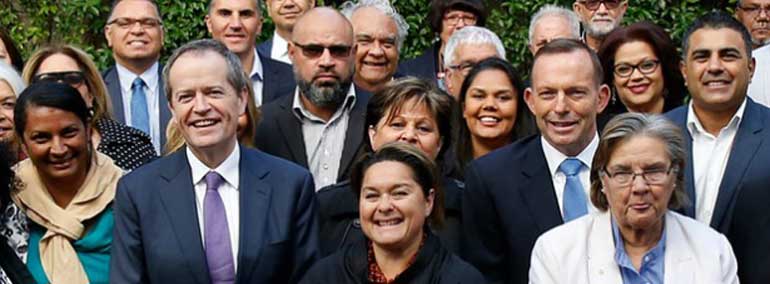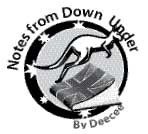Saturday Feb 14, 2026
Saturday Feb 14, 2026
Saturday, 11 July 2015 00:00 - - {{hitsCtrl.values.hits}}
 Prime Minister Abbot (right in tie) and Opposition leader Shorten (left) with the participants
Prime Minister Abbot (right in tie) and Opposition leader Shorten (left) with the participants
Constitutional recognition for indigenous people in Australia is a problem that has still to be resolved. It affects Aboriginal and Torres Strait Islander Peoples. The former are legally defined as people who are members “of the Aboriginal race of Australia” while the latter are the indigenous people of the Torres Strait Island in Queensland.
In the current context where these people are still not recognised in the Australian Constitution (about which most people are surprised and shocked that the Constitution allows discrimination), a historic meeting took place a few days ago.
Australia’s Prime Minister Tony Abbot (Liberal Party) and Opposition Leader Bill Shorten (Labour) convened a summit of the leaders of the two categories of indigenous people to discuss the steps in holding a referendum to recognise the first Australians and deal with discriminatory clauses in the Constitution. This is the first time in the history of Australia that a meeting of this type was convened.
Several decisions have been made at the meeting. Among them are:
n A Referendum Council is to be established to progress issues such as settling the referendum issue and timing. Regular progress reports will be sent to the Prime Minister and Opposition Leader.
n A series of community conferences are to be held throughout the country to provide an opportunity to everyone to have a say and to consider all significant points of view.
n A discussion paper is to be developed by the Parliamentary Joint Committee on Constitutional Recognition.
Meanwhile, there is fast growing support for an updated Constitution that reflects the reality of Australia today. Many people feel the Constitution should be amended to secure better treatment of Indigenous Australians and stronger protection of their unique cultures, languages and spiritual connection to the land. Newspoll, a market research company found that 75% of Australians support some kind of constitutional reform to recognise Indigenous Australians.
Apart from government agencies, civil society groups are also promoting reconciliation. Active among such groups is Reconciliation Australia, an independent, national not-for-profit organisation which is promoting reconciliation by building relationships, respect and trust between the wider Australian community and Aboriginal and Torres Strait Islander peoples.
Its vision is “for everyone to wake to a reconciled, just and equitable Australia.” The aim is “to inspire and enable all Australians to contribute to reconciliation and break down stereotypes and discrimination.”
“We will know we have achieved our vision when Aboriginal and Torres Strait Islander history, culture and rights are a proud part of our everyday life,” says Reconciliation Australia. 
Working as a part of the organisation is RECOGNISE – the people’s movement to recognise Aboriginal and Torres Strait Islander peoples in the Australian Constitution and ensure there’s no place in it for racial discrimination.
“We want to see fairness and respect at the heart of our Constitution, and to ensure racial discrimination has no place in it. Our goal is a more united nation. This is a chance for Australia to acknowledge the first chapter of our national story, and to forge our future together,” they say.
Welcoming the agreement and the spirit in which it was forged as signs of real progress towards settling on the best model to be put to a referendum, RECONISE called it a significant step towards constitutional recognition.
“But our task remains the same. We need to continue the crucial work of raising awareness and building support for the recognition of Australia’s first peoples.”